Events
Events
Department of Mathematics Events
Every Monday: Rowan Chess Club
The Rowan Chess Club plays casual timed and untimed over the board games of chess. Don't know how to play and want to learn? No problem - we'll teach you! Learning how to play is fairly easy. Getting really good at it is the hard part!
Date: Every Monday
Time: 5:00 p.m.
Location: Robinson Hall, room 328U
Questions? Please contact Ira Fine at fine@rowan.edu - office located in James Hall, room 1125
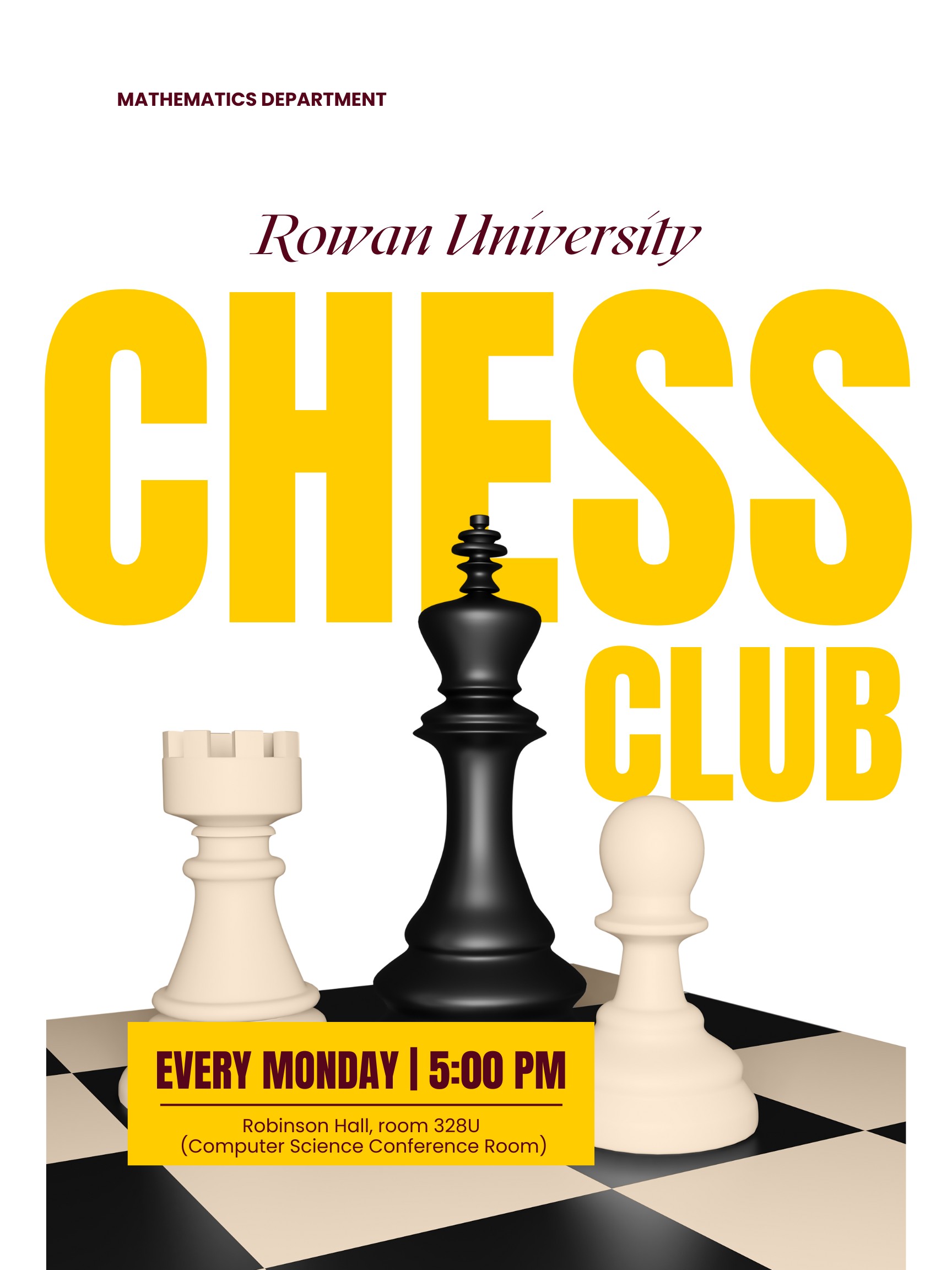
November 24, 2025: Rowan Association for Women in Mathematics Bake Sale
Save the date for Association for Women in Mathematics' (AWM) Fall Bake Sale on Monday, November 24. They will be selling fall-themed baked goods at a table outside of the Student Center from 11:00am until 2:00pm. Check flyer for additional details. Hope to see you there!
Date: November 24, 2025
Time: 11:00 - 2:00 p.m.
Location: Outside of the Chamberlain Student Center
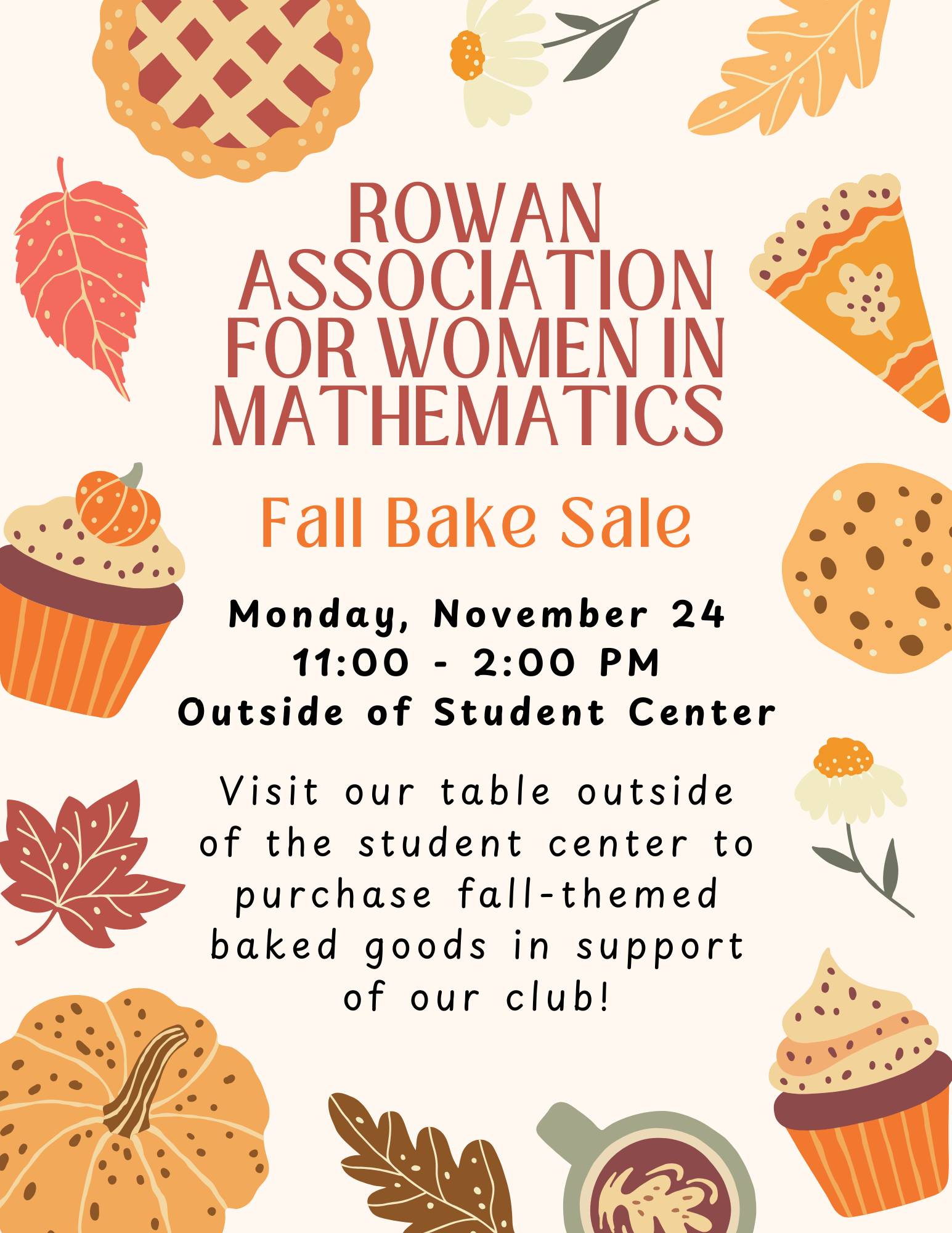
November 20, 2025: Rowan Association for Women in Mathematics Meeting
Save the date for Association for Women in Mathematics' (AWM) next meeting Thursday, November 20. They will be collecting non-perishable food donations to give to Rowan's SHOP for Thanksgiving - please check attached flyer for a list of preferred items to donate. Pizza will be provided for all those who attend. Meeting will be held in James Hall, room 2099 at 6:30pm. Check flyer for additional details. Hope to see you there!
Date: November 20, 2025
Time: 6:30 - 7:30 p.m.
Location: James Hall, room 2099

November 12, 2025: Data Science Network Social
The Mathematics Department would like to invite all undergraduate Data Science majors to attend our Fall 2025 Data Science Network Social. All students who attend will have an opportunity to contribute to the program's growth as well as network with current Data Science faculty. There will also be pizza and refreshments for all invited students. Please RSVP on the form at https://docs.google.com/forms/d/1aUR2GyV-y9ZWMkpUC8vMPBTQpH-A0m48VnC2Bo7dTII/preview. We look forward to seeing you there!
Date: November 12, 2025
Time: 3:30 - 4:45 p.m.
Location: Robinson Hall, room 207
Questions? Please contact Gina Magliocco at maglioccog@rowan.edu

November 12, 2025: Math Team Meeting
Math & Data Science Students,
Save the date for Math Team's next meeting next Wednesday, November 12. There will be puzzle games and other fun math-related activities. The meeting will be held in James Hall, room 2102 at 6pm. Pizza will be served to all who attend. Please see flyer for details. Hope to see you there!
Date: November 12, 2025
Time: 6:00 - 7:00 p.m.
Location: James Hall, room 2102
Questions? Please contact Gina Magliocco at maglioccog@rowan.edu
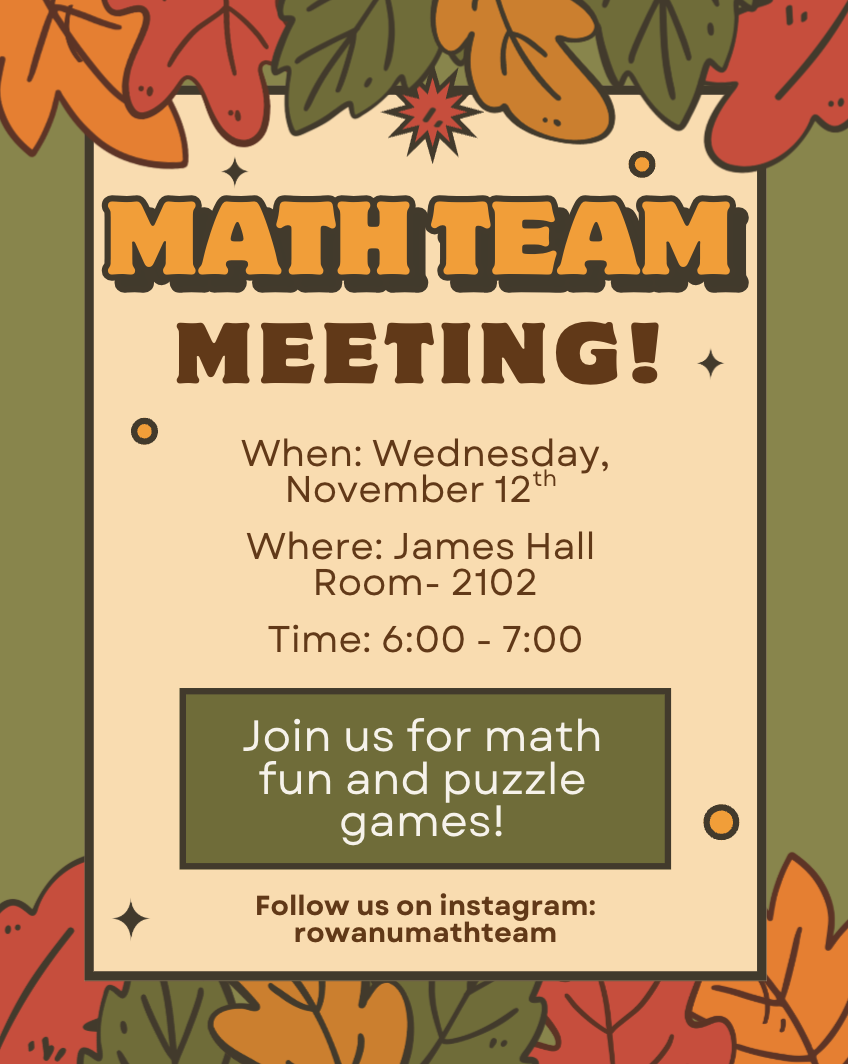
November 03 - 19, 2025: Rowan Chess Club Thanksgiving "Adopt a Family" Food Drive
Rowan Chess Club is participating in the annual Thanksgiving Food Drive. If you would like to participate, please drop off donations in the boxes that are located in the MLC (Robinson 228P in the Mathematics suite). The last day for drop off is Thursday November 19. Please see attached flyer and list for any tips on what kind of items to bring (NO refrigerated items please!)
Drop-off Date: November 03 - November 19, 2025
Drop-off Times: 9:00 - 4:00 p.m.
Drop-off Location: Robinson Hall, room 228P
Questions? Please contact Ira Fine at fine@rowan.edu

October 29, 2025: Mathematics Colloquium Talk #2
Faculty & Students,
You are cordially invited to the next Mathematics Colloquium talk on October 29, 2025. The speaker is Dr. Pham Duy Khanh, Associate Professor, Department of Mathematics, Ho Chi Minh City University of Education, Vietnam.
Title: "Coderivative-Based Newton Methods and Applications".
Abstract: This talk presents new Newton-type methods to solve structured nonconvex and nonsmooth optimization problems with justifying their fast local and global convergence by means of advanced tools of variational analysis and generalized differentiation. The objective functions belong to a broad class of prox-regular functions with specification to constrained optimization of nonconvex structured sums. We also develop a novel line search method, which is an extension of the proximal gradient algorithm while allowing us to globalize the proposed coderivative-based Newton methods by incorporating the machinery of forward-backward envelopes. Applications and numerical experiments, which are provided for nonconvex least squares regression models, Student’s t-regression, and image restoration problems, demonstrate the efficiency of the proposed algorithms.
About the speaker: Dr. Pham Duy Khanh earned his Ph.D. in Applied Mathematics from the Institute of Mathematics, Vietnam Academy of Science and Technology, in 2015, and later completed a postdoctoral fellowship at the Center for Mathematical Modeling (CMM), University of Chile. He is now an Associate Professor at Ho Chi Minh City University of Education, Vietnam. His research focuses on variational analysis, optimization theory, and their applications to machine learning, with publications in top journals such as Mathematical Programming, SIAM Journal on Optimization, Mathematics of Operations Research. Since 2023, he has served as an Associate Editor of Optimization, a long-standing and prestigious journal in optimization and operations research. Dr. Khanh has advised over 20 undergraduate students, many of whom have gone on to Ph.D. programs at prestigious universities in the U.S., Europe, Australia, etc. and he has been co-advising four Ph.D. students in the U.S.
Date: Wednesday, October 29, 2025
Time: 3:30 p.m.
Location: James Hall, room 2101 (or Zoom)
Questions? Please contact Dr. Thanh Nguyen at nguyent@rowan.edu
October 22, 2025: Student Research Workshop
Save the date for the Mathematics Department's Student Research Workshop. This is a great opportunity for students to learn about current research from faculty as well as the benefits of becoming a research assistant. See flyer for details.
Presentation: Presentation slides
Date: October 22, 2025
Time: 3:30 p.m.
Location: James Hall, room 2101
Questions? Please contact Gina Magliocco at maglioccog@rowan.edu
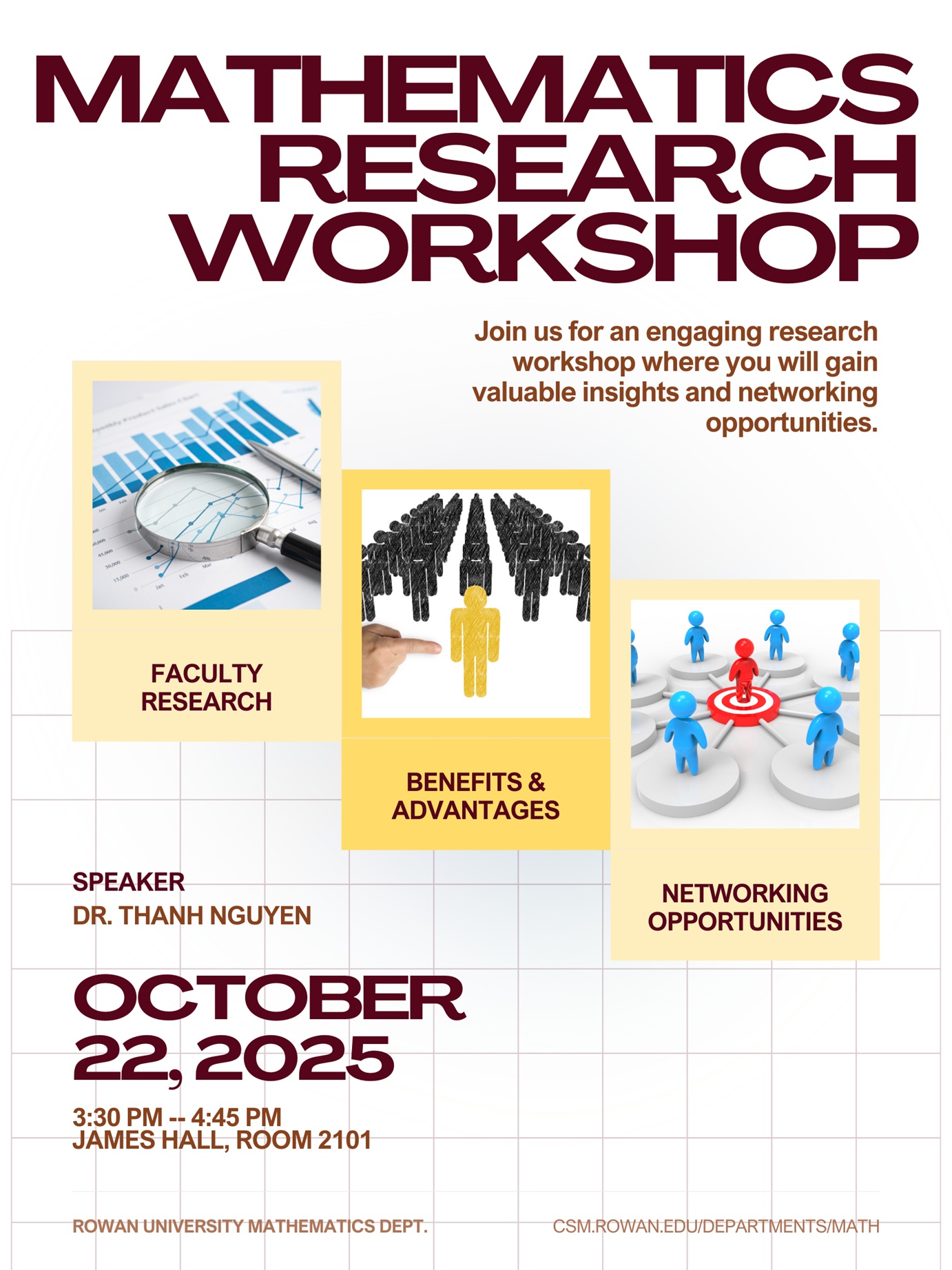
October 16, 2025: Talk by Guest Speaker Dr. Walter Kappeler
Please join us for a guest speaker talk by Dr. Walter Kappeler, Superintendent and Principal of Creativity CoLaboratory Charter School. Dr. Kappeler will be speaking about teaching middle school-level math, life as a middle school teacher, and more. The talk will be held on Thursday, October 16 at 6:30pm in Robinson Hall, room 207 (or via Zoom - link is the QR code on the attached flyer).
Date: October 16, 2025
Time: 6:30 p.m.
Location: Robinson Hall, room 207 (or via Zoom - link is the QR code on the attached flyer)
Questions? Please contact Christine Barden at bardenc@rowan.edu

October 10, 2025: Lecture Series - More on Proofs Techniques and Examples - Part 2
Please join us for the third session of Dr. Freeman's Number Theory Seminar, this Friday October 10th at 11am in Robinson Hall, room 201B. The topic discussed will be "More on Proof Techniques and Examples - Part 2". See attached flyer for details.
Date: October 10, 2025
Time: 11:00 a.m.
Location: Robinson Hall, room 201B
Questions? Please contact Dr. Freeman at freeman@rowan.edu
Below is the tentative schedule for the series (we will see how far we get each week)
- 09.26.2025: Basic Logic and Proof Techniques
- 10.03.2025: More on Proof Techniques and Examples - Part 1
- 10.10.2025: More on Proof Techniques and Examples - Part 2
- 10.17.2025: Introduction to Number Theory
- 10.24.2025: Divisibility and Primes - Part 1
- 10.31.2025: Divisibility and Primes - Part 2
- 11.07.2025: Divisibility and Primes - Part 3
- 11.14.2025: Congruences - Part 1
- 11.21.2025: Congruences - Part 2
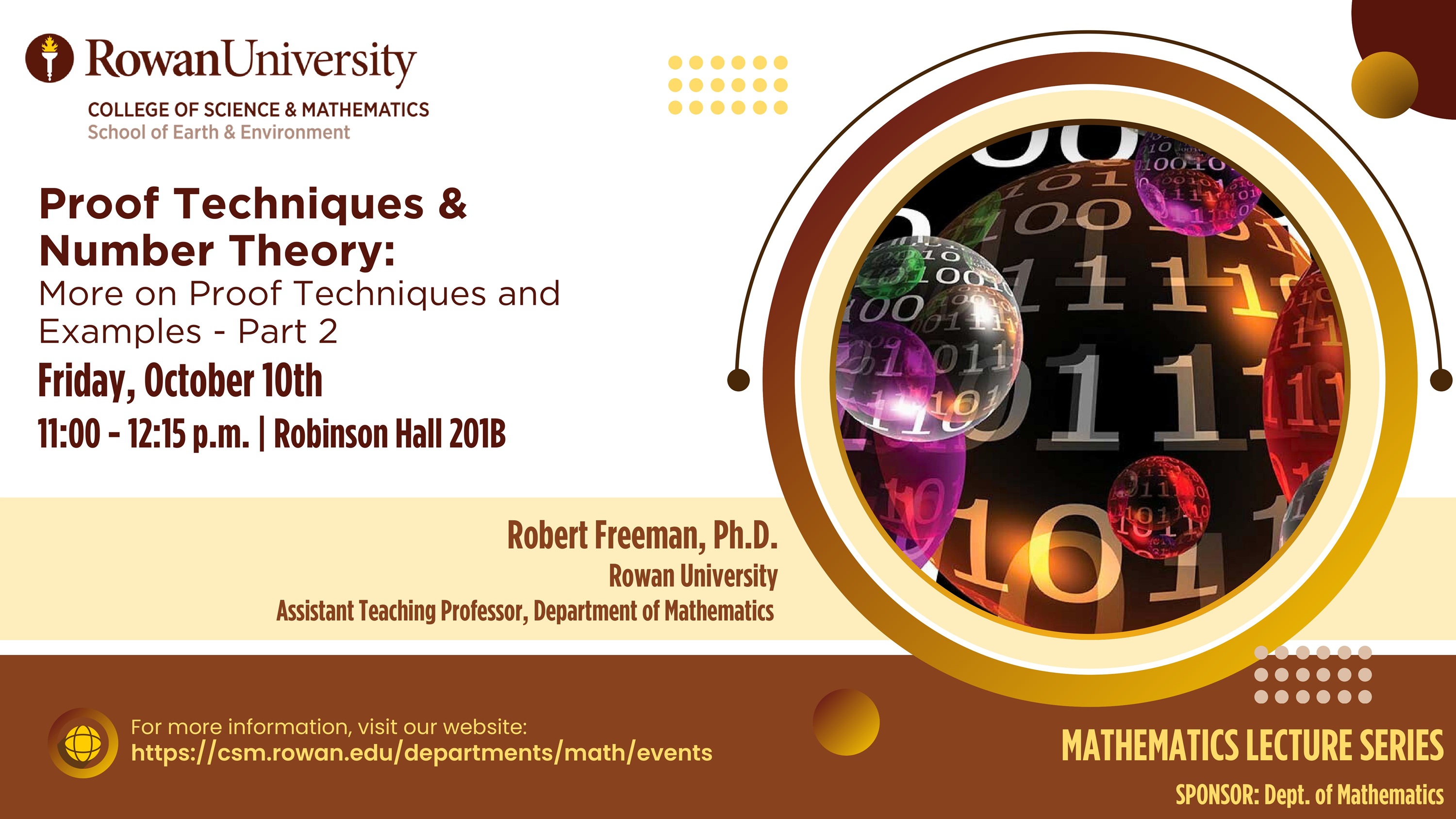
October 10, 2025: Putnam Math Practice #1
Please join us for the first practice session for the Putnam Mathematics Competition. These practices are student-led. Students will work together to review their mathematical knowledge and practice solving previous Putnam problems in order to prepare for the real competition (date coming soon).
Date: October 10, 2025
Time: 3:30 p.m.
Location: Robinson Hall, room 230-A2
Questions? Please contact Hieu Nguyen at nguyen@rowan.edu
October 08, 2025: Math Team Meeting
Save the date for Math Team's meeting next Wednesday, October 8th. The meeting's theme is Halloween! The fun will be held in James Hall, room 2102 at 6pm. See flyer for details.
Date: October 08, 2025
Time: 6:15 p.m.
Location: Chamberlain Student Center, room 144
Questions? Please contact Gina Magliocco at maglioccog@rowan.edu
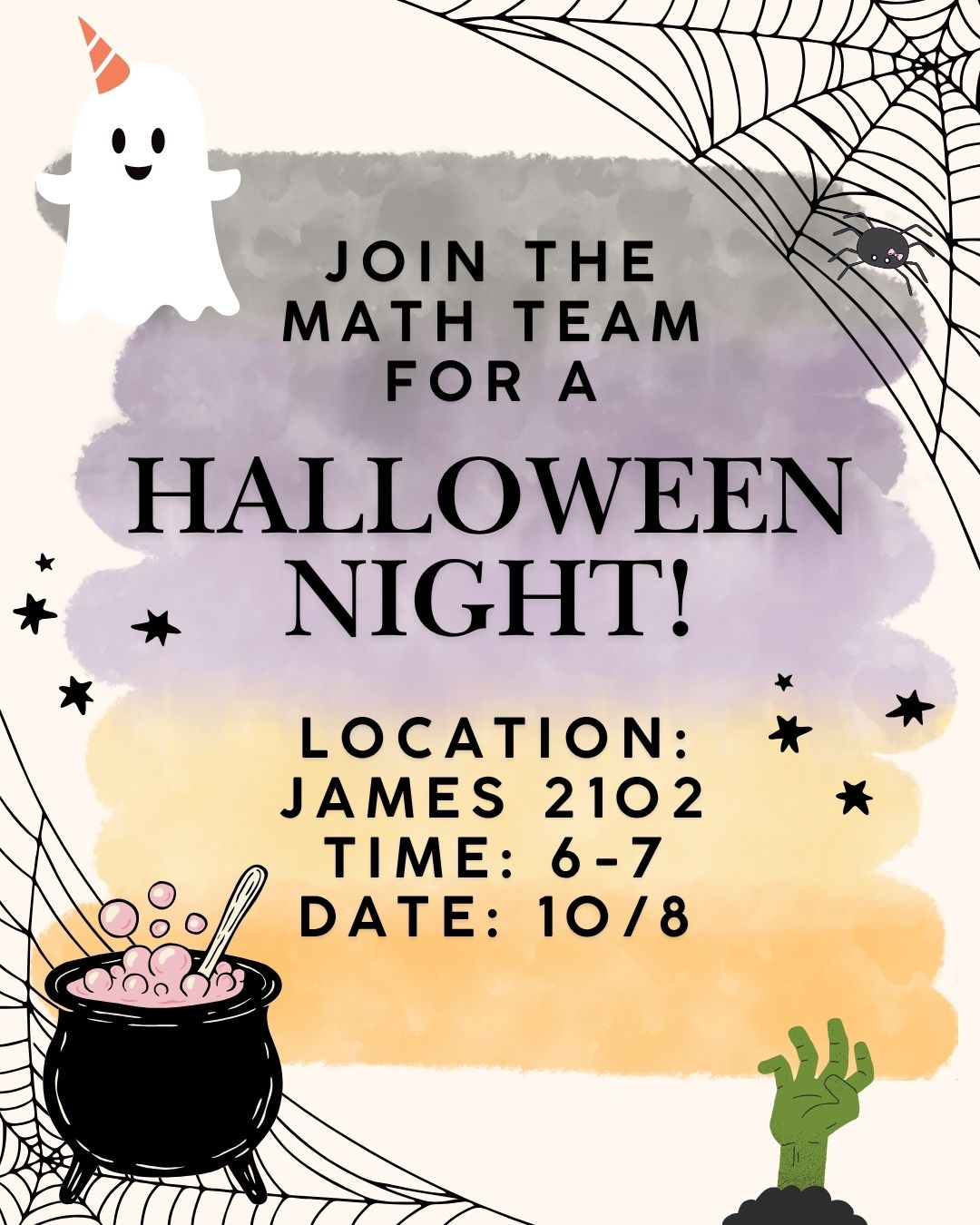
October 03, 2025: Lecture Series - More on Proof Techniques and Examples - Part 1
Starting Friday, September 26th and each Friday for the entire semester, from 11:00-12:15, we will begin a series of lectures on how to prove statements in mathematics and building towards a foundation of how to attack proofs in number theory. The goal of the lecture series is to generate greater interest in mathematics at Rowan University that could potentially lead to undergraduate research. This lecture series is for anyone interested in learning proof structure in mathematics and exploring some of the concepts in number theory. We will meet in Robinson 201B
The topic of number theory was chosen because not much background information is necessary for one to grasp, understand, and prove ideas in the subject. ALL are welcome to join us and participate.
Below is the tentative schedule for the series (we will see how far we get each week)
- 09.26.2025: Basic Logic and Proof Techniques
- 10.03.2025: More on Proof Techniques and Examples - Part 1
- 10.10.2025: More on Proof Techniques and Examples - Part 2
- 10.17.2025: Introduction to Number Theory
- 10.24.2025: Divisibility and Primes - Part 1
- 10.31.2025: Divisibility and Primes - Part 2
- 11.07.2025: Divisibility and Primes - Part 3
- 11.14.2025: Congruences - Part 1
- 11.21.2025: Congruences - Part 2
IF YOU HAVE ANY QUESTIONS OR WISH TO SPEAK WITH ME, PLEASE FEEL FREE TO CONTACT ME THROUGH MY EMAIL: freeman@rowan.edu
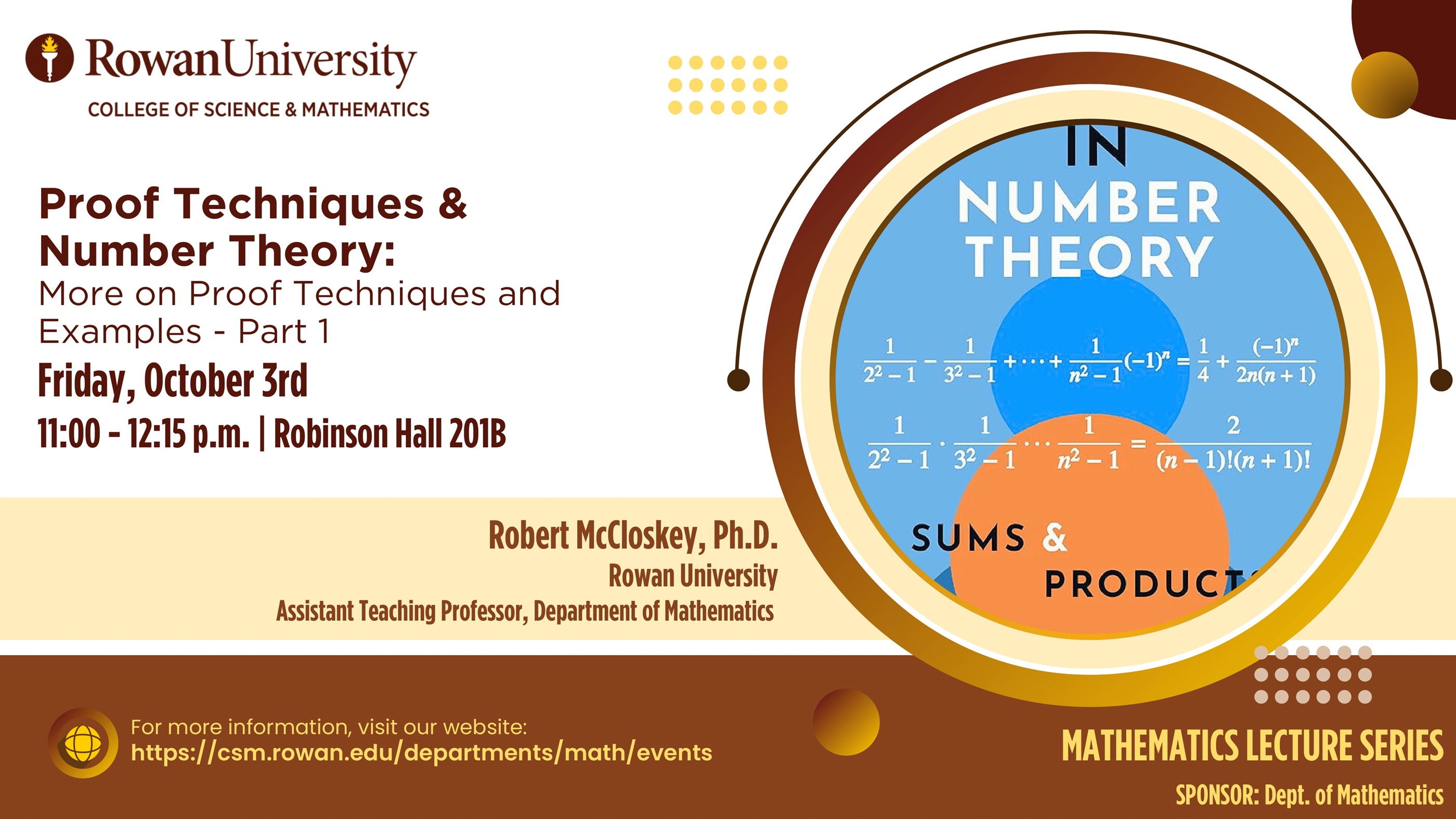
October 01, 2025: Mathematics Meet & Greet
All Freshmen & Transfer students in Mathematics and Data Science are invited to attend our annual Mathematics Fall Meet & Greet! Those who attend can expect pizza, refreshments, math games/puzzles, club info, and chances to meet full-time faculty, and members of the Math Team and Assocation for Women in Mathematics (AWM).
Date: October 1, 2025
Time: 3:30-4:45 p.m.
Location: Robinson Circle
Questions? Please contact Gina Magliocco at maglioccog@rowan.edu
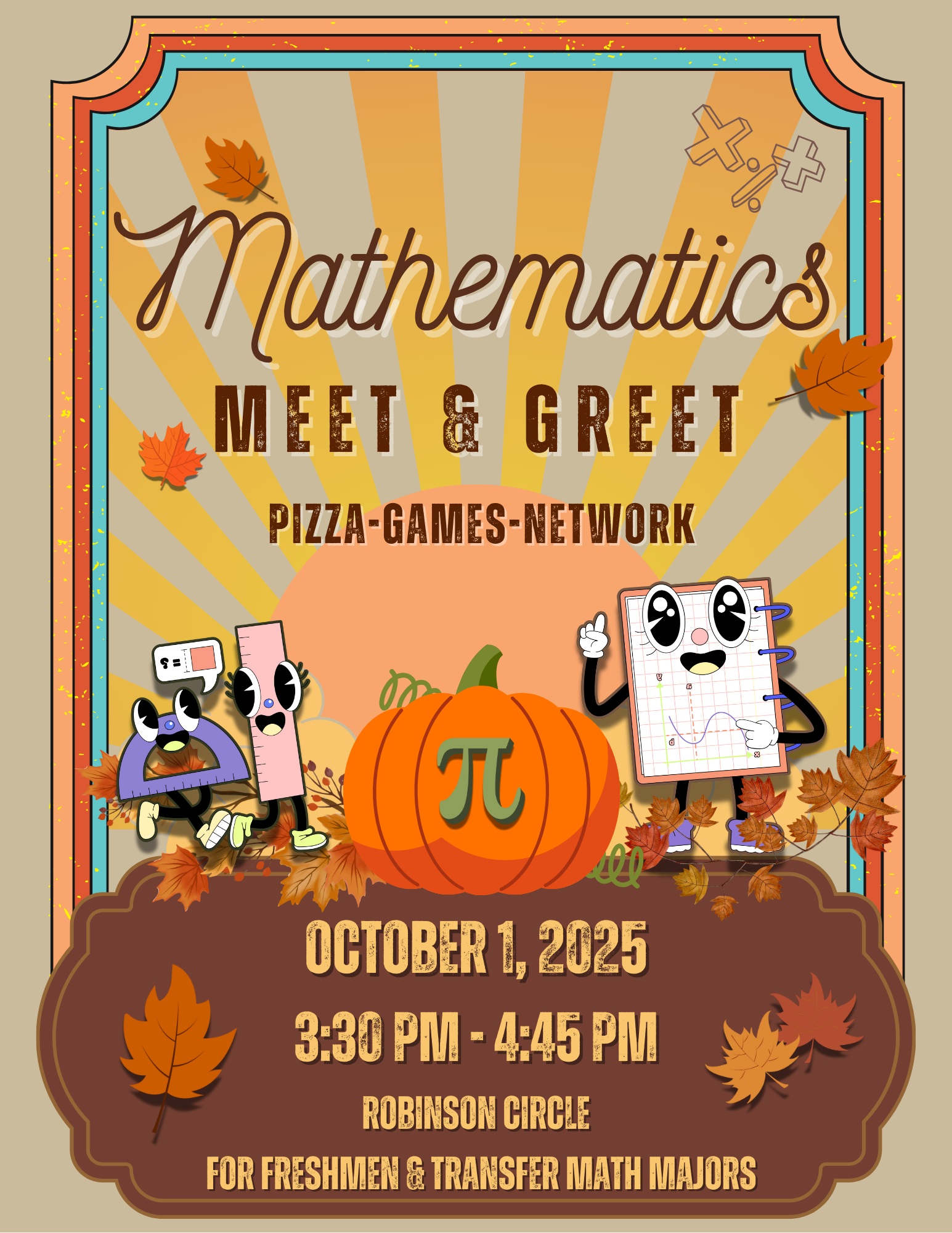
September 26, 2025: Lecture Series - Proof Techniques & Number Theory
Starting Friday, September 26th and each Friday for the entire semester, from 11:00-12:15, we will begin a series of lectures on how to prove statements in mathematics and building towards a foundation of how to attack proofs in number theory. The goal of the lecture series is to generate greater interest in mathematics at Rowan University that could potentially lead to undergraduate research. This lecture series is for anyone interested in learning proof structure in mathematics and exploring some of the concepts in number theory. We will meet in Robinson 201B
The topic of number theory was chosen because not much background information is necessary for one to grasp, understand, and prove ideas in the subject. ALL are welcome to join us and participate.
Below is the tentative schedule for the series (we will see how far we get each week)
- 09.26.2025: Basic Logic and Proof Techniques
- 10.03.2025: More on Proof Techniques and Examples - Part 1
- 10.10.2025: More on Proof Techniques and Examples - Part 2
- 10.17.2025: Introduction to Number Theory
- 10.24.2025: Divisibility and Primes - Part 1
- 10.31.2025: Divisibility and Primes - Part 2
- 11.07.2025: Divisibility and Primes - Part 3
- 11.14.2025: Congruences - Part 1
- 11.21.2025: Congruences - Part 2
IF YOU HAVE ANY QUESTIONS OR WISH TO SPEAK WITH ME, PLEASE FEEL FREE TO CONTACT ME THROUGH MY EMAIL: freeman@rowan.edu
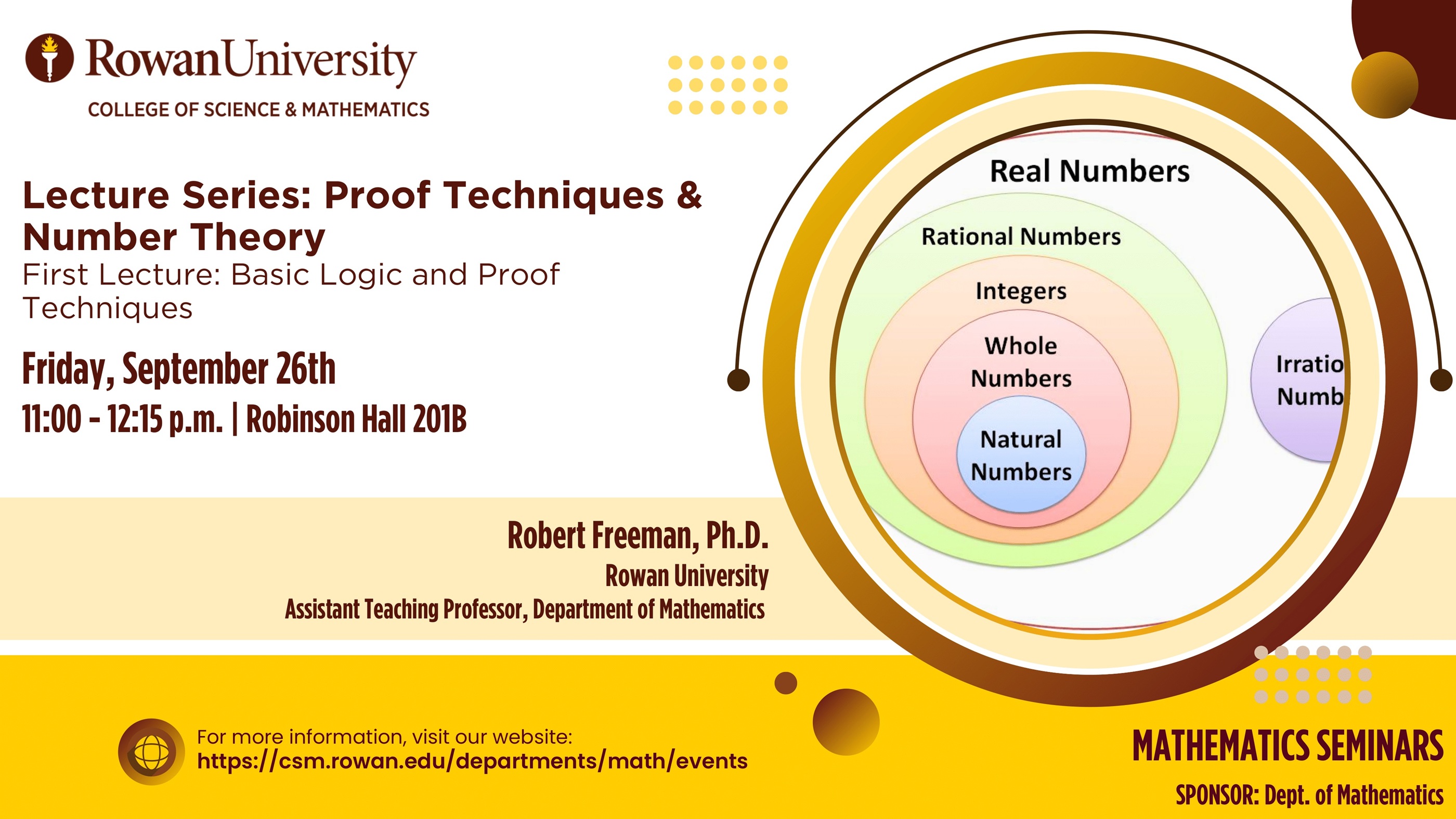
September 24, 2025: Mathematics Colloquium
You are cordially invited to the next Mathematics Colloquium talk given on Wednesday 09/24. Details of the talk are given below.
Date: September 24, 2025
Time: 3:30-4:30 p.m.
Location: James Hall, room 2101 (for remote attendees: Zoom link)
Speaker: Yong Chen, Ph.D., Department of Biological and Biomedical Sciences, Rowan University.
Title: A Statistical Framework for Differential Expression Analysis in scRNA-seq via the Difference of Two Negative Binomial Distributions.
Abstract: High-throughput sequencing (HTS) technologies, especially single-cell RNA sequencing (scRNA-seq), produce count-based data often modeled by the negative binomial (NB) distribution. However, comparative analysis between two groups—such as identifying differentially expressed genes (DEGs)—requires assessing the statistical behavior of the difference between two NB-distributed variables. Despite the wide use of NB models, the theoretical properties of the Difference of Two Negative Binomials (DOTNB) distribution remain understudied. We derived key analytical results for DOTNB, including its probability mass function, moments, and asymptotic properties. Based on these results, we introduced DEGage, a statistical method for detecting DEGs in scRNA-seq data. DEGage uses sample-wise differences in gene expression as the test statistic and calculates P-values directly from the DOTNB distribution. Benchmarking on both simulated and real scRNA-seq datasets, DEGage outperforms five popular DEG detection tools: DESeq2, DEsingle, edgeR, Monocle3 and scDD. It shows particular strength under challenging conditions such as high dropout rates, unbalanced group sizes, and small sample sizes. Applied to prostate cancer scRNA-seq data, DEGage identifies robust marker genes across 17 cell types. In mouse neuron data, it reveals eight novel memory-associated genes not detected in prior studies. Overall, our work provides a theoretical foundation for DOTNB and demonstrates its practical utility in differential analysis of count data. The DEGage software is open-source and broadly applicable to HTS-based studies.
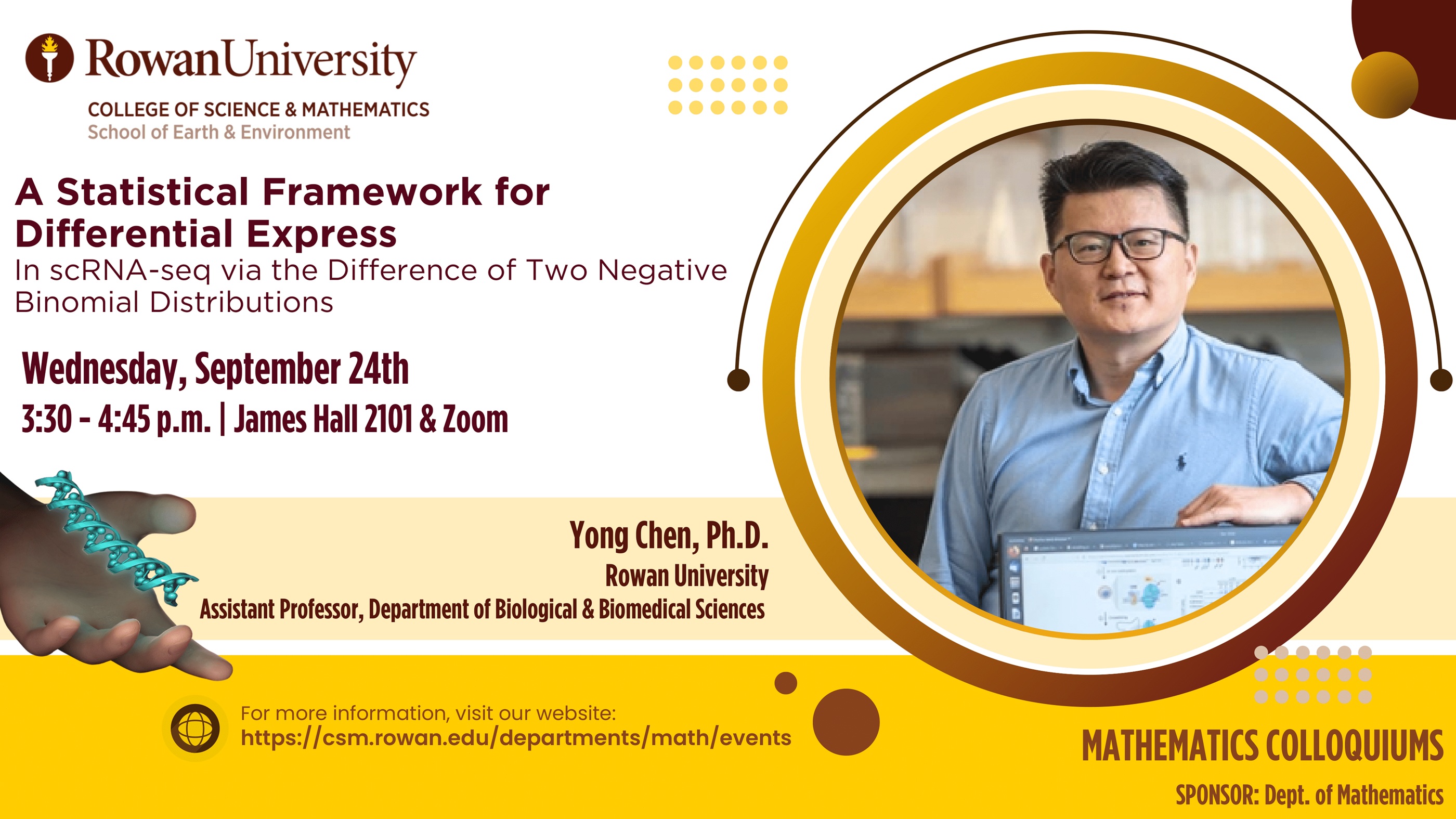
April 3, 2025: Alumni Career Panel
Spring 25 Alumni Career Panel
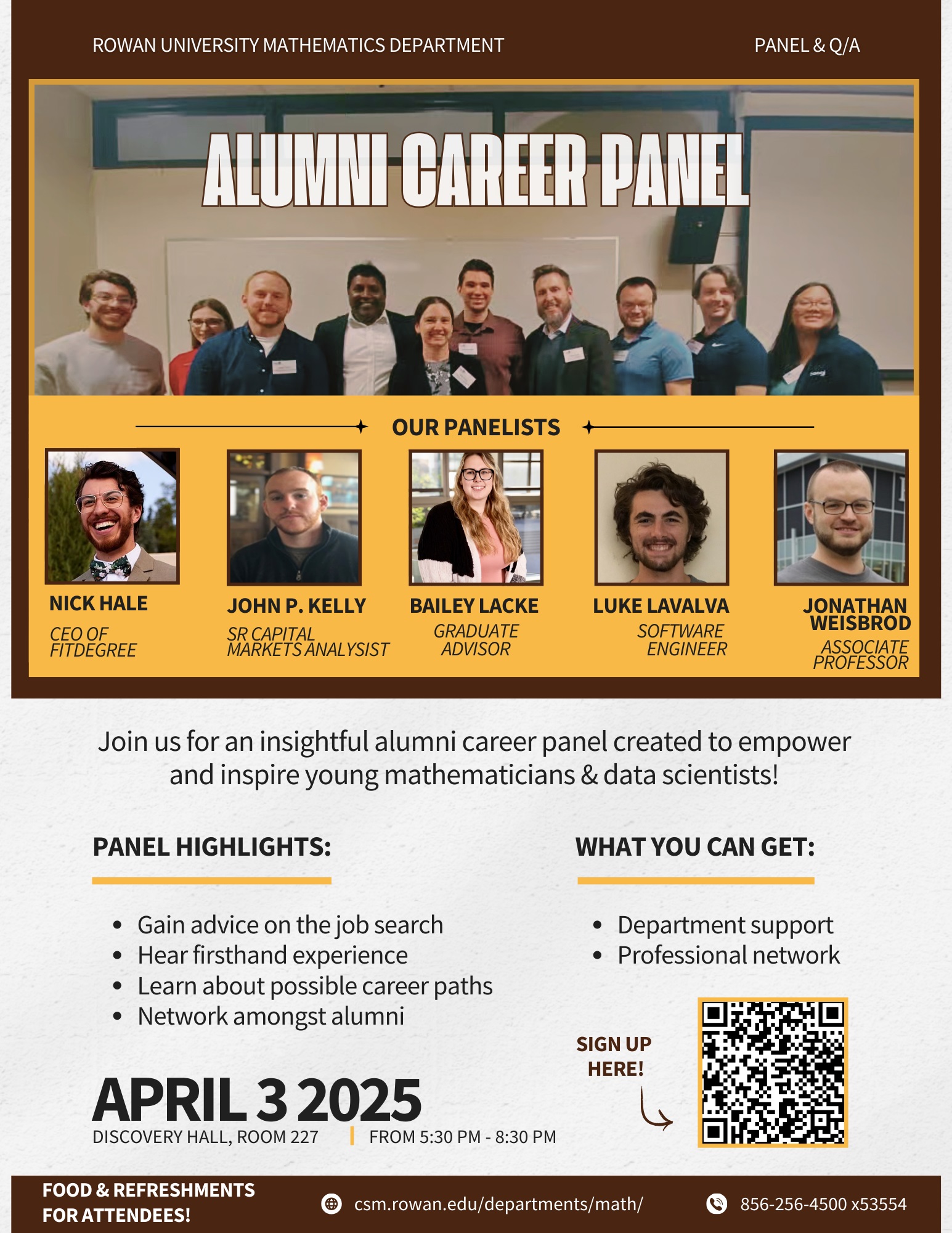
March 12, 2025: Rowan Math Department Colloquium
Rowan Math Department Colloquium
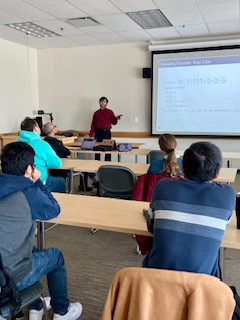
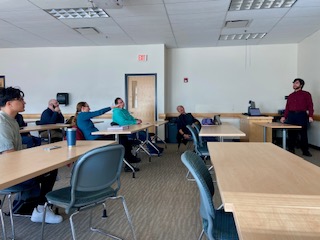
March 7, 2025: AI Tools for Agriculture
AI Tools for Agriculture Roundtable Conference
March 7, 2025, Atlantic Cape Community College
In support of New Jersey’s commitment to become a national leader in AI and establish an AI Hub, the New Jersey Big Data Alliance, Rutgers University, and Rowan University hosted its first annual roundtable conference that drew New Jersey farmers, researchers, and other stakeholders together to learn about emerging AI trends in agriculture. With 44 people in attendance, this inaugural event featured a keynote presentation by Dr. Kristin Dana (Rutgers University), remarks by Edward Wengryn (NJ Secretary of Agriculture), and a series of lightning talks describing the latest advances in AgTech, including a joint talk by Dr. Thanh Nguyen (Rowan University) and Dr. Thierry Besancon (Marucci Center for Blueberry and Cranberry Research) who spoke on using AI to detect and map weeds in cranberry bogs. The conference ended with a breakout session where groups discussed important agricultural challenges facing New Jersey farmers that can be solved using AI and ways to create a new research community that will spearhead opportunities to advance the field.
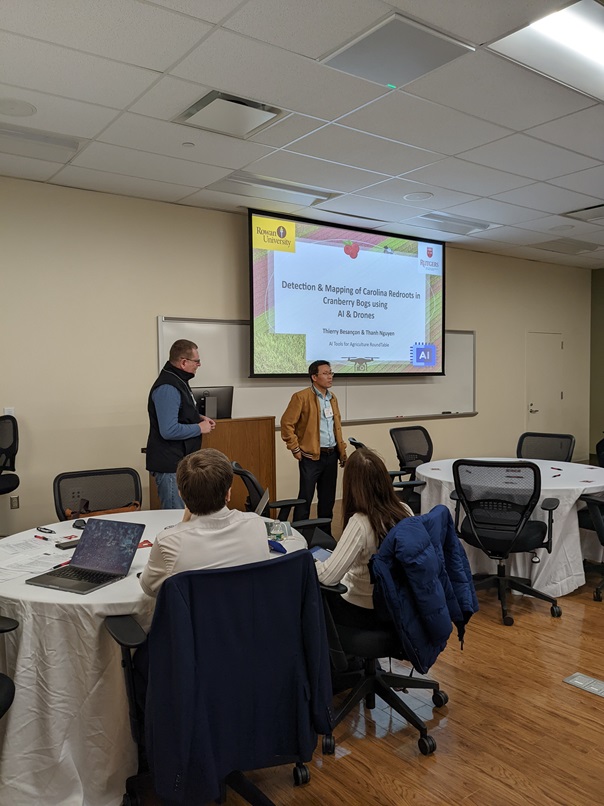
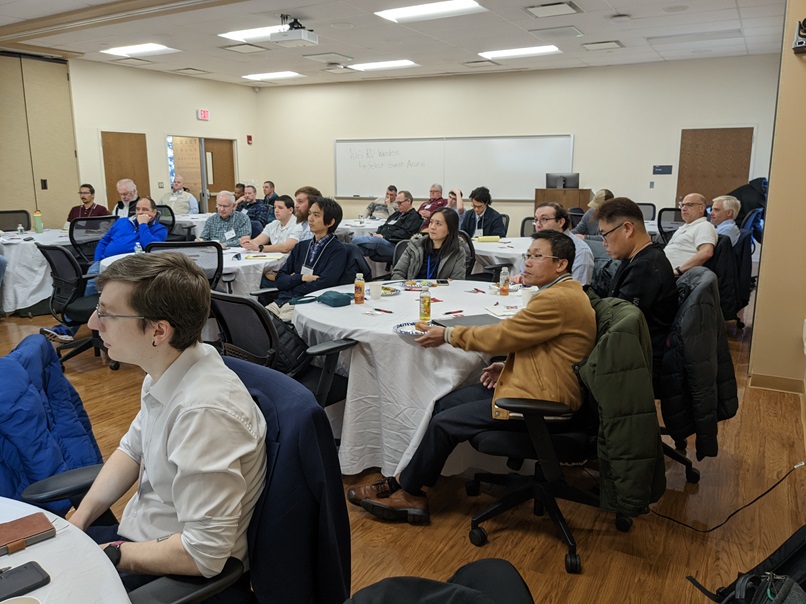
February 5, 2025: Actuary Talk with Matthew Murgo
Students are invited to attend an Actuary Talk given by Rowan Mathematics alum, Matthew Murgo. Matthew will share a presentation on his experiences as an Actuary as well as how well Rowan prepared him for the career. Pizza, snacks, refreshments, and news of the Actuary's Club revival will be provided to all students who attend.
Date: Feburary 5, 2025
Time: 3:30 - 4:45 p.m.
Location: Business Hall, Room 104A
Questions? Please contact Gina Magliocco at maglioccog@rowan.edu
December 4, 2024: Data Science Network Social
All students in the Data Science program are invited to our first-ever Data Science Network Social! This is a great way to network with faculty and peers, and learn about our latest program. There will be pizza, snacks, and refreshments for all attendees.
Date: December 4, 2024
Time: 3:30 - 4:45 p.m.
Location: Robinson Hall, Room 315L
Questions? Please contact Gina Magliocco at maglioccog@rowan.edu
October 23, 2024: Math Student Research Workshop
All Mathematics students are invited to attend the department’s annual Student Research Workshop, hosted by Dr. Thanh Nguyen. This is a perfect opportunity for students to learn about the research our faculty are currently working on, as well as how to become a future research assistant.
Date: October 23, 2024
Time: 3:30 - 5:30 p.m.
Location: James Hall, Room 3117
Questions? Please contact Gina Magliocco at maglioccog@rowan.edu
October 9, 2024: Math Colloquium
Speaker: Dante Graves (Rowan Alum currently working as a data scientist)
Topic: Bayesian inference: what is the posterior, and why does it matter?
Date: Wednesday, October 9, 2024
Time: 9:00 a.m. - 2:00 p.m.
Location: James Hall 1115 and Zoom
Questions? Please contact Dr. Thanh Nguyen at Nguyent@rowan.edu
Abstract: Bayesian Inference is a topic that continues to gain popularity in machine learning. Undoubtedly, a large part of its appeal is due to its strong foundations in probability, which make it a powerful framework for addressing a wide range of applications.
In this talk we'll consider one of the key elements of Bayesian Inference that makes it such a useful paradigm - the posterior distribution. In particular we will emphasize how our understanding of the posterior as a random variable presents opportunities in data science that go beyond producing simple point estimates or confidence intervals. After providing the necessary background and theory behind this methodology, we'll walk through a number of real world examples that illustrate the advantages it affords.
The primary goal of this talk is to provide a fun and informative talk on an accessible topic that connects the dots between mathematical theory and practice. Additionally, students interested in careers outside of academia will get a glimpse into what a career in industry might look like for a math major.
October 4, 2024: Datathon Workshop for Students
The Department of Mathematics will host the NJ Big Data Alliance for a half-day conference called "Winning Strategies: Mastering Hackathons and Data Science Competitions." The session, which will be led by a variety of data science leaders, will talk about what it takes to compete and succeed in data hackathons, how to select a winning idea and execute it efficiently, how to use popular hackathon tools and design principles, and how to enhance their presentation skills to impress judges.
Date: October 4, 2024
Time: 9:00 a.m. - 2:00 p.m.
Location: Business Hall, Room 104
Questions? Please contact Dr. Hieu Nguyen at Nguyen@rowan.edu
September 25, 2024: Mathematics Meet & Greet
All Freshmen & Transfer students in Mathematics are invited to attend our annual Mathematics Fall Meet & Greet! Those who attend can expect pizza, refreshments, math games/puzzles, and chances to meet full-time faculty and members of the Math Team.
Date: September 25, 2024
Time: 3:00 - 5:00 p.m.
Location: Robinson Circle
Questions? Please contact Gina Magliocco at maglioccog@rowan.edu